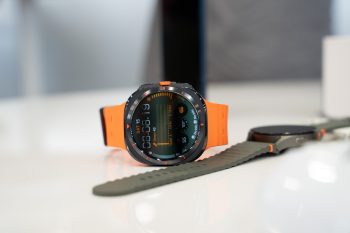
Sure, the Galaxy Watch Ultra Kinda Copies Apple, but it Shouldn’t Matter
So it’s been a bit of time now since Samsung debuted its newest hardware offerings, some of which were notable for being notorious among tech discussions online. We’re of course referring to the Galaxy Buds 3 Pro and the Galaxy Watch Ultra, with extra emphasis on the latter – and you probably know why.
READ: Samsung’s Product Design Team has Seemingly Lost its Way
Ever since its launch, the Galaxy Watch Ultra has received a fair amount of criticism from most tech enthusiasts due to a rather derivative design which brings to mind the Apple Watch Ultra. Apple’s flagship wearable is the most obvious competitor in this particular product segment, and most will point to similarities between the two devices, mostly from an aesthetic standpoint.
With that being said however, the Galaxy Watch Ultra does come with some advantages over Apple’s offering.
Hardware Versatility
At this point in time, the age-old argument of Android vs iOS is one that usually leans towards a more subjective, case-by-case basis. Most people will go with the watch that they’re comfortable with, and more importantly works with their device – after all, Apple Watches are designed to only work with iPhones, for example.
This is one field where the Galaxy Watch Ultra has an advantage, as users aren’t necessarily locked to a single brand or ecosystem. Being a Wear OS device, the Galaxy Watch Ultra will work whether you have a Samsung phone, Google Pixel device, or any other major Android brand out there. Sure, there are some limitations when pairing it with non-Samsung devices, but all in all the flexibility of Android – and Wear OS for that matter – makes the Galaxy Watch Ultra a more versatile smartwatch.
A Matter of AI?
Another area where the Galaxy Watch Ultra shines is with Samsung’s integration of AI-based features. Let’s get this out of the way – not everyone is a fan of these new generative AI features that manufacturers keep pushing on consumers, although it should be noted the Galaxy Watch Ultra does take things in a bit of a different direction.
Samsung claims that it’s designed the Galaxy Watch Ultra to use AI for health and fitness features – according to the company, users get access to improved sleep tracking options and workout routines, receive detailed analyses of their current health and sleep patterns, all with AI. One could argue that this is all simply marketing speak, but at the core of it all there is some AI working in there.
By contrast, Apple’s adoption of AI features is still just taking off, and even then it seems like most of the focus is on its main flagship devices, i.e. iPhones and Macs. There is of course the possibility that we might see Apple unveil AI-based features come September, but at the moment the Galaxy Watch Ultra has the advantage in this category.
The Beauty of Wear OS
Let’s go back to Wear OS – similar to Android, Google’s wearable software platform shares a lot of the same characteristics, being that it’s quite flexible when it comes to user customizability. Sure, Wear OS on the Galaxy Watch Ultra is ultimately bound by the limitations that One UI imposes, but it still carries over a lot of the personalization options that make the platform appealing to power users.
Of course, one might say that the average smartwatch user doesn’t care about elements like these and instead just wants a perfectly functional smartwatch like the Apple Watch Ultra. There’s nothing wrong with that for sure, but given the price that Samsung is charging for its Ultra wearable, it’s nice to have such options available.
Final Thoughts
Looks aside, there’s a lot beneath the Galaxy Watch Ultra’s exterior that sets it apart from the Apple Watch Ultra. Some might say that the similarities are only skin-deep, and it takes a bit of time to see what Samsung is offering users with its latest flagship wearable. In any case, the device does warrant a closer look, especially for folks looking for a competent Android equivalent to the Apple Watch Ultra.